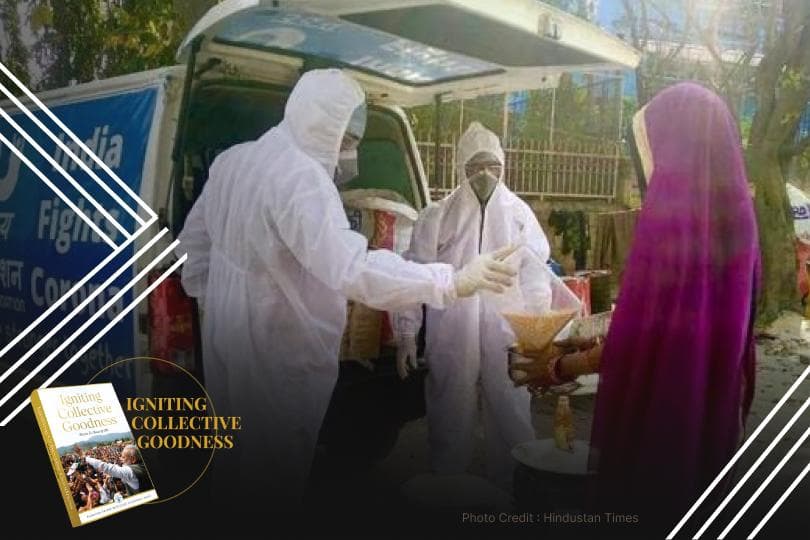India's Remarkable Response to the Pandemic
Jan Bhagidari (people’s participation) to Combat the Covid-19 Pandemic

“India’s Corona story is an unrivalled success story,” states the book ‘Igniting Collective Goodness’. And, with good basis. Of all the countries in the world, India, with the largest population, a high percentage of illiteracy, a population with large numbers of migrant workers returning home, had some of the lowest mortality, highest recovery rates in the world. India undertook the world’s largest vaccine programme. India vaccinated its citizens faster than anywhere else in the world.
As is referenced in Igniting Collective Goodness, I also believe the success of India in managing this crisis lies in its people “Jan Bhagidari” and in its leadership. PM Modi, for many reasons, including his Mann Ki Baat conversations, carries a credibility that transcends political gain, profit-taking, ideologies, and fear-mongering. He leads by example, never chides, merely tries reason and concern as his tools to lead his people to safety and recovery from this world-wide scourge.
As an aside, I was an American citizen living in Florida during the early pandemic. We had a very different experience than India due to our leadership both nationally and in the state of Florida. I personally lost family and friends as a result. I personally suffered from the ravages of this disease despite being vaccinated. Although I am not a fan of hindsight criticism, the unified people of India should stand tall with the overall handling of this crisis by their leadership as it compares to the rest of the world. Not only did they save millions by their actions, they emerged stronger as a nation, their souls intact, knowing they did the best possible with a very difficult situation.
“Prime Minister Narendra Modi towered above the combined fears, apprehensions, doubts, and despondence with his compassionate yet commanding presence - he was ready to tackle a deadly pandemic, validated by a billion-plus hopes,” states the book in chapter 4 of Igniting Collective Goodness.
Modi hailing a cumulative success, “My dear countrymen, last year it was in this very month of March that the country heard of the term Jana Curfew for the first time. Just have a look at the might of a great praja, the people of a great country… Janta (citizens) curfew became an object of bewilderment for the entire world. It was an unprecedented example of discipline; generations to come will feel proud of that. Similar to that are the effects we made to express honour and respect for our Corona Warriors, by banging thalis, applauding them and lighting lamps for them.”
One of the most inspiring stories in Igniting Collective Goodness is Modi’s recitation of the events unfolding in Arunachal Pradesh. Mirem Village of Siang district had a very large population of remote workers. When the pandemic hit, they started returning to the village in great numbers. Rather than succumb to mass infections or heartlessly turn their fellow villagers away, the residents decided to make arrangements in advance to house and feed the returning workers in quarantine. They built huts equipped with toilets, water, electricity, and all the essentials for daily life. As the workers returned, they were safely housed and upon clearance from quarantine welcomed home. It is a story Modi related with delight and a grateful heart as it set an example for the entire country of innovation, caring, and responsibility toward fellow man.
In my mind, it reflects perfectly what it truly means to be Indian. As the world looks for solutions to intractable problems, the example of the Mirem Village shines as an example to be followed.
As Modi has iterated in Mann Ki Baat’s 64th episode: “When a mask is required most, we tend to remove it. At such times, I urge you that whenever you feel your mask is bothersome and you want to remove it, spare a thought for the doctors, nurses, and other Corona Warriors. You will find them wearing masks for hours together, diligently working to save lives. They sometimes wear masks for a span of eight to ten hours. Doesn’t that discomfort them? Just think about them…you too will feel that as citizens. You should not be negligent at all, not allow others to be so.”
The PM’s empathy both for the reticent as well as the warrior allows the faint-hearted to become strong and persevere.
It is remarkable to reflect on the effective use of both traditional healthcare alongside western allopathy. Dr. Nimesh Desai, former Director of the Institute of Human Behaviour and Allied Science, indicates, “A balanced view, as per me, is what we implemented at the Evens Hospital where I worked for 23 years. If some patient came there, then all allopathy medicine was not forced on them. Just like a cafeteria, we made all the AYUSH (Ayurveda, Yoga, Naturopathy, Unani, Siddha and Homeopathy) systems available to them. People were free to take whichever system they liked. So a balanced view will be to promote Indian systems, and while our south Indian/South Asian values must be promoted, the boundaries of science must also be maintained.”
The wisdom of this thinking, understood and communicated clearly through the vehicle of Mann Ki Baat is extraordinary. Prime Minister Narendra Modi never once politicized, demonized, gave quarter to fear-mongering or allowed for crazed theories to be promoted. He simply stated the facts, allowed people to choose their path based on information that was solid and clearly communicated with their best interest at heart.
Although to Indian nationals this may seem obvious and without alternative, in other realities throughout the globe this was not the case. If only the Guru of India was the Guru for the world in this matter!



































